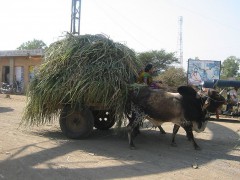Mobile Business School in India

This article was originally drafted by the Strategic Foresight Group for the newsletter “Asian Horizons” as part of the Rockefeller Foundation’s Searchlight Process. For more Searchlight content on futurechallenges.org, please click here.
A mobile business school model has been conceived and run by a local NGO in Maharashtra, the Mann Deshi Foundation. This model has the potential to be replicated in other parts of the country, and could have a significant impact on the financial security of poor rural women.
The Mann Deshi Foundation runs numerous programs, including a co-operative bank, the Mann Deshi Mahila Sahakari Bank that is aimed towards helping poor rural women attain financial security.

Sugar cane bullock cart in Maharashtra (By Yann (Self-published work by Yann) [GFDL (http://www.gnu.org/copyleft/fdl.html), CC-BY-SA-3.0 (http://creativecommons.org/licenses/by-sa/3.0/) or CC-BY-SA-2.5-2.0-1.0 (http://creativecommons.org/licenses/by-sa/2.5-2.0-1.0)], via Wikimedia Commons)
The Mann Deshi Business School (MDBS) was started in 2006. The MDBS provides various courses, including financial training and marketing skills. Courses last between 2 and 8 weeks, and are geared towards the rural women considered to be the ‘poorest of the poor’. At present, these classes are offered in villages in the states of Maharashtra and Karnataka. As of 2010, 27,453 women have taken these courses, of which an estimated 60% have gone on to set up and operate their own businesses.
The Foundation has also implemented a venture through which MDBS has been made mobile. By using a bus that has been converted into a mobile classroom, the Mobile Business School for Rural Women offers various business skills and courses, including micro-finance, savings, loans, pensions and insurance, marketing, and ICT literacy. The buses operate in villages in Maharashtra and Karnataka. Thus far, around 8527 women have graduated from the Mobile Business School in Karnataka alone. The Mobile Business School also offers vocational training courses including tailoring, agriculture and screen painting. A second bus was launched by the Foundation in 2009 as part of the Mobile Business School with aid from the UK-based Bonita Trust. This bus is specifically focused on remote villages in Karnataka and Maharashtra.

This model has the potential to be replicated in other parts of India. The short duration of the courses enables poor women to commit a specific amount of time to it, at the end of which they have practical skills that enable them run a business or plan their financial future. As the skills are taught by a foundation that also operates a micro-credit facility, they are able to obtain a loan to start their business. Teaching practical skills on financial literacy also allows them to become more financially secure by opening bank accounts, or learning about the types of entitlements that are owed to them by the government. At present, MDBS only operates 2 buses, thereby limiting the coverage of the program. Foundations can design and implement, or fund similar programs to expand adult literacy through mobile schools in other parts of India. The scope of the schools can also be increased to cover more than just business skills.

